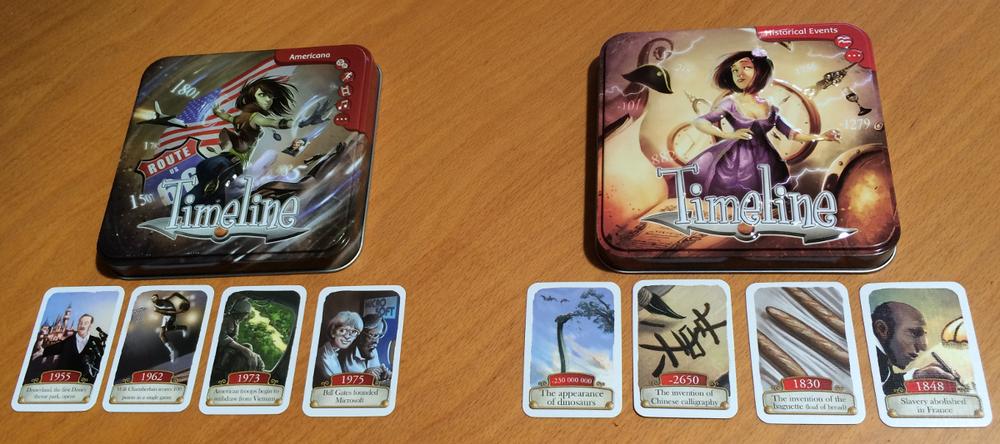
I like to challenge myself by testing what I know, and if I get to learn something new in the process, all the better. That’s why I love trivia games. But straight trivia games (Trivial Pursuit and the like) aren’t everyone’s cup of tea. That’s why I look for games that add some other features or sophistication to the straight facts. Asmodee Games offers exactly that in its Timeline and CardLine games.
Timeline: Americana and Historical Events
Timeline is not a new game, but it keeps cranking out more versions all the time, which is great news for lovers of the game. Since players can become familiar with each box’s cards pretty quickly, being able to play new versions, or mixing several versions together, really extends gameplay. It also allows you to change up the rules, too, with plenty of cards to make longer sequences.
If you’re unfamiliar with Timeline, here’s a brief rundown of the game. The game consists of a deck of about 110 small cards with events and dates, and the goal is all about putting them in chronological order. The game is for ages 8 and up, requires 2-8 players, and takes about 15 minutes for a round. It’s a perfect option to fit in between longer games, or to fill in while waiting for others to finish a game. Though the age range does go down to 8, younger kids may struggle with it, as with other trivia games, for the reason that kids just may not know as many facts as older kids and adults. Know your kids, and try to achieve a balance in the game. It is recommended that the youngest player goes first, which is a good start, because it creates a bigger challenge for players who come later. But you may need to add in additional handicaps for the adults.
Each Timeline card’s imagery is shown on both sides, but the date for the event is only shown on one side. Players are dealt four cards, date-side down, and a card is placed in the middle of the table. The date of the middle card is then shown. The first player then places one of their cards before or after the starting card in the timeline sequence, then flips it over to see if they are correct. If they are, the card stays. If they aren’t, the card gets discarded and the player draws another card to put in front of them. Play passes to the next player, who then considers all the cards in the middle of the table when placing one of their own cards in the sequence. The game gets harder as you go, since gaps in the timeline fill up quickly. Once someone has played all of their cards, if they are the only person to go out during that round around the table, they win. If more than one person goes out during a round, those who still have cards are eliminated and a tie-breaker commences with the remaining players drawing another card. As soon as there is a round when only one person can play their last card correctly, that player is the winner.
One feature of the rules that I like is that they encourage you to consider beginning the game with different numbers of cards, depending on your skill level. You can also choose to clear the timeline after each round and changing the starting player, making it easier for all players. And players can create any number of house rules, changing up the game to suit your tastes, number and age of players, and any other factors you want.
While I’ve played a few versions before, I’m reviewing the Americana and Historical Events versions, which fit quite well with my passion for history. These aren’t brand new versions, but they also aren’t ones that I see at game nights very often. Gameplay is the same as with the other versions of Timeline. To try out these versions, I played the game in groups of four and five, which is a challenging number, especially when kids are playing. Fewer players make for an easier game.
Even die-hard history lovers like myself will learn something new in these versions of the game, such as the year that Europeans discovered the shallot. But we also found some questionable dates, such as the year the bald eagle became America’s national bird (the card said 1570, and since there was no U.S.A. in 1570 and thus no nation to have an official bird, we decided to just pull that one out of the deck). But other than that, it was a hit with everyone who played, of all ages, even with non-history-trivia-loving folk.
Note: There are a few disturbing images on some of the cards, so know your audience. Also, the game includes cards depicting some aspects of history that are/were not racially sensitive, such as Al Jolson wearing blackface for The Jazz Singer. In addition, the Americana version was published in 2014, and thus the card that depicts Ms. Jenner’s decathlon win uses her deadname. Consider treating these and other cards as teachable moments with your kids, to discuss events and changes throughout history. You may inspire one of them to dig more deeply into history on their own.

CardLine: Globetrotter and Dinosaurs
CardLine is another line of games, very similar to Timeline, but with different themes. I was able to review CardLine Globetrotter and CardLine Dinosaurs, though Animals is also available. Gameplay is essentially the same (though the Dinosaurs version is for age 7 and up) as for Timeline, but there are some stark differences to the cards and content. First of all, the cards are larger. These cards are much easier to shuffle, and they have more real estate for imagery and data. This is important because there are more options for creating a sequence for these cards, which should be determined before play begins. Dinosaurs allows players to choose between dinosaur weight and length/height, and Globetrotter has four sequence choices: land and inner water area, population, gross domestic product, and carbon dioxide emissions. The cards for both games also include plenty of additional information, such as what dinosaurs eat (carnovore, herbivore, omnivore) and the continent and flag for each country.
These games felt quite different from Timeline, even though the gameplay is the same because you’re considering entirely different material when putting them in a sequence. You’re delving deeply into your geography and dinosaur knowledge, instead of historical events. CardLine has earned its own place in our game rotation. We did have a few small issues with the cards, though. For CardLine Dinosaurs, a few of the cards don’t list the weight of the animals, because no one has been able to determine it, so you’re supposed to take them out if you’re using weight for the sequence. For CardLine Globetrotter, so much data is included, and even though the cards are a decent size, it is difficult to read the numbers. I wish the commas were more prominent and the text bolder. But since you’re allowed to pick the cards up to look at the numbers, it isn’t a big deal.
The CardLine games were actually harder than Timeline for us because it’s harder to know definitively how countries relate in size, population, GPD, or carbon dioxide emissions, or how dinosaurs that you may have never heard of relate in weight or size, when all you have to go by is a drawing. There ended up being a lot of guessing, but the games helped us understand our world much better. The only disadvantage to it over Timeline is that it doesn’t make sense to mix the versions together. I look forward to seeing other titles in the CardLine line.
My family, friends, and I all really enjoy all of these games, and I do recommend them for families and people who love their facts. They’re also short and small (if you took the insert out, you could fit several games in each tin), and perfect for trips or game nights. They’re affordable, at about $10-12 each. Also, inevitably, you learn something new, which is always a plus in my book. We found ourselves taking to Google to learn more about events or facts with which we were unfamiliar.
Asmodee Games publishes a wide variety of game types. Check out their whole lineup!
Note: I received a copy of the games for review.


